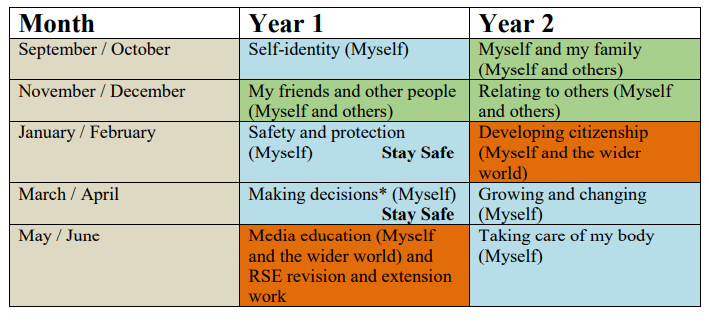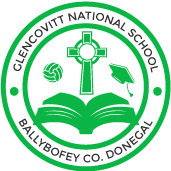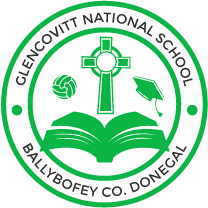Social, Personal and Health Education (SPHE) Policy
(Encompassing RSE – Relationship and Sexuality Education)
Introductory Statement
It was decided to review the SPHE policy in March 2019 on review of the existing policy dated February 2003. This policy also encompasses RSE in the school.
Rationale
Physical education provides children with learning opportunities through the medium of movement and contributes tThe plan is a record of whole school decisions in relation to SPHE in line with the Primary Curriculum 1999. Its purpose is to guide the teachers in adopting a consistent and coherent approach to the teaching and learning of SPHE in our school. It is intended to guide teachers in their individual planning for SPHE to ensure appropriate coverage of all aspects of the curriculum from junior infants to sixth class. o their overall development by helping them to lead full, active and healthy lives. We aim to provide these learning opportunities to the children in our school to maximise active learning experiences and approaches to the benefit of each individual child.
Vision and Aims
Our school values the uniqueness of all individuals within a caring school community. We recognise that SPHE is intrinsic to the learning and teaching that occurs both formally and informally in the school and in the classroom. Through our SPHE programme, we wish to assist children to develop feelings of self-worth and self-confidence while encouraging their ability to relate to others in a positive way. The programme also encourages children to be aware of their rights as individual while at the same time accepting responsibility for their actions as members of the school and the wider community. Parents have the primary role in the social, personal and health education of their children so their involvement will be encouraged as much as possible.
We endorse the aims and objectives of the Curriculum for SPHE and in addition we emphasise the following:
- To enable the children to develop an awareness of their responsibilities to others in a caring community
- To enable the children to take greater control of their personal lives as individuals
- To encourage the children to be active in determining their own learning.
Content of the Plan Strands and Strand Units
SPHE is planned in such a way that the child will receive a comprehensive programme in SPHE over a two year period. Teachers are familiar with the content objectives for their class level. The strand units not covered in year one must be included in the teacher’s planning for the following year. In some cases it may be necessary to revise specific objectives from the previous year. Active learning is the principal teaching and learning approach recommended for SPHE. The SPHE programme reflects a spiral approach, where similar aspects are revisited in different ways according to the age, stage of development and readiness of the child.
Year 1 is odd/even e.g. 2023/2024
Year 2 is even /odd e.g. 2022/2023

Making decisions is only a strand unit from 3rd – 6th. Junior Infants – 2nd may complete the Safety Issues section of Safety and Protection strand unit at this time. Due to the increased amount of lessons in the Stay Safe Programme from 3rd to 6th class, placing the strand unit Making Decisions after the Safety and Protection strand unit in a standard two year plan will enable the teacher to achieve some of the content objectives of Making Decisions through the Stay Safe Programme.
The Prim-Ed books “Primary SPHE” have lots of resources for the Media Education Strand Unit
**** To meet the requirements of the Department of Education and Science Child Protection Guidelines and Procedures, the Stay Safe Programme should be taught in its entirety under ‘Safety and Protection’. ****
Contexts for SPHE
- SPHE will be taught through a combination of contexts.
- Positive school climate and atmosphere
- Discrete time
- Integration with other subject areas
Positive school climate and atmosphere
Teachers are aware of the importance of promoting a positive school climate. Our key messages are:
- We cater for the individual needs of the children. Individual needs may be social, emotional, spiritual, physical or intellectual. Through assessment, observation and discussion with parents we strive to identify and meet individual needs.
- We provide opportunities to enhance the self-esteem of all members of the school community. The staff is aware of their role in helping children to develop their self-esteem by creating an environment within the school that is as positive as possible for all concerned.
- We aim to actively value diversity and to prioritise inclusive and respectful language. We believe that children learn to respect themselves and others through experiencing respect in their own lives and through witnessing respect being shown to others.
- We work to develop an effective communication system with the school and between school and home.
- We are a Health Promoting School and support a health-promoting physical environment. Our participation in the Healthy Ireland (H.I.) initiative and the Active Schools Programme enables us to foster a culture that a healthy body leads to a healthy mind. An emphasis on healthy lunches, healthy lifestyle, road safety, water safety, farm safety and regular fire drills are some of the areas promoted. Taking responsibility and pride in the school environment is encouraged through our litter prevention programme, our involvement in the Green Schools programme and through constant review and promotion of behaviour habits required for maintaining a clean environment.
- We promote democratic processes in all levels of school life while balancing roles, rights and responsibilities.
Children experience and practice the democratic process by: Negotiating the class rules at the start of the year
- Sharing responsibility
- Valuing the opinion of others
- Experiencing a sense of belonging to their own class group and the wider school community
- Developing a sense of commitment to common goals.
Discrete time
SPHE may be timetabled for ½ hour per week, one hour per fortnight or blocks of 1 – 2 hours per month where feasible or appropriate. Children who are withdrawn for supplementary teaching must be included for as much of the SPHE programme as possible. The discrete time is used to develop and practise particular skills, deal with sensitive issues or explore issues that are not addressed in other areas of the curriculum. Content objectives dealing with RSE and child protection are addressed through discrete time.
Integration
At each class level, teachers may seek to integrate SPHE with other curricular areas. Many aspects of SPHE can be dealt with in the context of Religion, English, Gaeilge, SESE, Visual Arts, Drama.
Approaches and methodologies
Teachers know that active learning is the principal learning and teaching approach used in the SPHE programme. The following active learning strategies are promoted for SPHE:
- Drama activities
- Co-operative games
- Pictures, photographs and visual images
- Discussion: in pairs, small groups, with whole class
- Written activities: surveys, questionnaires, lists, check-lists, projects, worksheets
- Media Studies Information and communication technologies
- Looking at children’s work: portfolios, projects, etc.
- Other strategies as devised by the class teacher
Assessment
- Children’s progress in SPHE is assessed mainly through teacher observation:
- The ability of the child to co-operate and work in groups or to work independently
- The informal interactions between the child and adults and between the child and other children
- Physical and emotional maturity
- The quality of presentation of work
- The participation and interest of the child in a variety of activities.
Children with different needs
The requirements of children with special needs will be taken into consideration when planning class lessons and related activities. Children who experience bereavement or loss, serious illness or other major personal situations are supported and consideration is given to meeting their individual needs in the most appropriate manner.
Equality of participation and access
We view the SPHE programme as playing a key role in ensuring equality of opportunities for all children.
Policies and programmes that support SPHE
SPHE links with other policies/ programmes used in the school: Child Protection, Code of Behaviour, Anti-Bullying, and Healthy Eating. Teachers are expected to be familiar with these policies and ensure that the school’s agreed policy is followed when addressing these issues.
Relationships and Sexuality Education (RSE)
This policy statement is an approved approach to the teaching of RSE in Glencovitt N.S/S.N. Gleann Coimhéad. It was reviewed in March 2019 on review of the existing policy in February 2004. It was developed to inform teachers and parents as to the material covered in the RSE programme within the SPHE curriculum.
School Philosophy
Glencovitt N.S. is a Catholic school under the patronage of the Bishop of Derry. It is managed by a Board of Management, elected according to the procedures agreed by the Partners in Education. The school has a Catholic ethos and this ethos is a guiding principle in the formulation and implementation of this RSE Policy. This ethos recognises the value and dignity of each pupil and all those working in the school community, and aims at promoting the full and harmonious development of all aspects of the person, including:
a)Relationship with God
b) Relationship with family
c) Relationship with teachers
d) Relationship with self
e) Relationship with others
f) Relationship with the environment.
This ethos also acknowledges the cultural and religious values of all the pupils attending the school. The school recognises that the parents are the primary educators of their children and we support them in that role.
In the area of RSE, above all, the schools’ role is subsidiary to that of the parents. We support and complement their work.
Definition of RSE
RSE is an integral part of Social, Personal and Health Education and must be taught in this context. It provides structured opportunities for pupils to acquire knowledge and understanding of human sexuality and relationships through processes, which will enable them to form values and establish behaviours within a moral, spiritual and social framework. (p.5 NCCA Curriculum and Guidelines for RSE). RSE is the formal approach to educating children in:
- Relationships with others – parents, siblings, friends and the community in general
- Respect for themselves and others
- Physical development – bodily functions and changes, and personal hygiene
- Emotional development – maturing in society
- Parenting, personal and social skills and relationships
- Sexuality in context – part of a loving relationship.
Relationship of RSE to SPHE and Religion
Social, Personal and Health Education contributes to developing the work of the school in promoting the health and well-being of children and young people. This happens in the context of their emotional, moral, social and spiritual growth, as well as their intellectual, physical, political, religious and creative development. (P.5 Going Forward Together Parents Information Booklet).
The key characteristics of this programme are that SPHE is a lifelong process and is a shared responsibility between family, school, health professionals and the community. The content of the programme falls under the following headings:
- Myself – Self-identity, taking care of my body, growing and changing, safety
- Myself and Others – Myself and family, friends and relating to other people
- Taking Care of My Body – Naming parts of the male and female body using appropriate terminology. Identifying physical changes. Understanding puberty and the Reproductive System (Senior Classes only)
- Growing and Changing – The stages of development of a baby from conception to birth (Middle Classes). The understanding of sexual relations within the context of a committed loving relationship (Senior Classes).
It is clear that Relationships and Sexuality Education is an integral part of the programme outlined above. Sexually sensitive issues will be covered within the strand units:
- Taking care of my body
- Growing and changing
- Safety and protection.
Current Provision
We are a child-centred school. The educational and emotional needs of the children in our care are central to our planning and policy making processes. Included in the school curriculum in Glencovitt NS are:
- Religious Education (Grow in Love)
- SPHE
- Stay Safe Programme
- Friends for Life
- Walk Tall
- Prim-Ed Anti-Bullying Programme
- Circle Time
- Worry Toolkit
Policies which support SPHE/RSE
- Code of Behaviour
- Anti-Bullying Policy
- Child Protection policy
- Enrolment Policy
- Mobile Phones and Electronic Devices policy
- Healthy Eating Policy
In keeping with the sentiment and spirit of these policies, we informally support many of the aims on which RSE is modelled. We encourage good behaviour, open communication, understanding and tolerance of differences, and respect for self and others. We recognise that both pupils and staff have rights and responsibilities in our school. A sense of responsibility is fostered and attention is paid to the well-being of all of the members of the school community.
Aims of our RSE programme
When due account is taken of intrinsic abilities and varying circumstances, the Relationships and Sexuality Education curriculum should enable the child to:
- Develop a positive sense of self-awareness, self-esteem and self-worth
- Develop an appreciation of the dignity, uniqueness and well-being of others
- Understand the nature, growth and development of relationships within families, in friendships and in wider contexts
- Develop an awareness of differing family patterns
- Come to value family life and appreciate the responsibilities of parenthood
- Develop strategies to make decisions, solve problems and implement actions in various personal, social and health contexts
- Become aware of the variety of ways in which individuals grow, change and understand that their developing sexuality is an important aspect of self-identity
- Develop personal skills, which will help to establish and sustain healthy personal relationships
- Develop some coping strategies to protect themselves and others from various forms of abuse
- Acquire and improve skills of communication and social interaction
- Acquire and use an appropriate vocabulary to discuss feelings, sexuality, growth and development
- Develop a critical understanding of external influences on lifestyles and decision making.
Guidelines for the Management and Organisation of RSE in our School
Curriculum Matters
The curriculum as published by the NCCA will be followed. All content objectives will be covered by the time each pupil leaves 6th class – (see Appendix A for further details). The curriculum will be taught from Infants to 6th class. It will be taught by the teaching staff. All resources used will be in keeping with the ethos of the school and this policy.
In a multi class situation (e.g. 3rd & 4th or 5th & 6th), teachers will ensure that classes are taught the appropriate lessons. This may include liaising with other staff members.
Organisational Matters
SPHE (including RSE) is taught in a two-year cycle. See the strands section of this document.
Taking Care of Myself is taught in March/April of Year 2
Growing and Changing is taught in January/February of Year 1
Safety and Protection is taught in January/February of Year 1
- Prior to the teaching of RSE lessons involving “sensitive issues”, parents will be informed by letter in Appendix C.
- If parents/guardians request the withdrawal of a child from RSE lessons, they should make an appointment to see the principal.
- With regard to matters of a confidential nature, the school cannot take any responsibility for what is discussed in the yard or classroom by the children. Should a child who is withdrawn from the sexually sensitive classes receive inappropriate information from others outside of these classes, it will be the responsibility of the parent/guardian to address the issues.
- Any teacher has the right to opt-out from teaching the sexually sensitive issues in RSE. It is responsibility of Board of Management to ensure that the curriculum will be delivered to the children by another teacher.
- Parents are welcome to view the curriculum and lessons, and may speak to the class teacher if they have any concerns.
Dealing with Questions
It is natural that children should wish to ask questions in the area of RSE. However, this area is treated somewhat differently from other subjects due to its sensitive nature.
All questions answered will reflect the parameters of the curriculum. Certain topics will not be discussed i.e. abortion, masturbation, contraception, etc. Questions to the teacher may be written or oral within the group setting and answered within the boundaries of the curriculum and school policy. Written questions will be screened for inappropriate topics before reading them aloud. If any questions asked by the children are judged to be inappropriate, the teacher will refer the child to their parents, or state that this information may be available at a later stage of the curriculum e.g. “That’s something that will be discussed in secondary school”. The school cannot guarantee confidentiality if a child asks a question of a personal nature or discloses personal information.
At all times we will endeavour to respect the right to privacy of staff and children.
Parental Involvement
Parents/guardians are the primary educators of their children and, as such, the school supports them in this role. The Parents’ Association may on occasion arrange for speakers/meetings to help parents in the task of communicating with their children on aspects of their development. Parents/guardians may access copies of the policy from the school office, or school website.
Resources
The Grow in Love programme, the RSE programme, the Stay Safe programme, the Walk Tall programme and a selection of other appropriate resources may be used.
All resources should be:
- Reflective of the school’s ethos
- In line with the principles of the SPHE curriculum
- Age appropriate
- Closely matched to specific objectives
- Free of bias, racial or sexual stereotyping.
- Produced by a reputable agency
Teachers should consult with the principal if unsure about the suitability of resources. All resources are available for parents/guardians to view if they so request prior to the delivery of the lesson.
Confidentiality:
Teachers establish ground rules covering the limits of the discussion, the level of respect required and the concept of confidentiality. All discussions will remain within the parameters of planned material. If a matter is divulged to a teacher where either an accusation or a suggestion of a criminal act is made, the matter should be brought to the attention of the principal, the Designated Liaison Person, who will refer it to the proper authorities. (see Children First Guidelines and our school’s Child Protection Policy). In these matters a teacher should never agree to keep a secret for a child.
Overview of Stay Safe Programme Aim:
To teach children personal safety skills so they can look after themselves in situations that could be upsetting or dangerous.
Content:
The lessons cover the following areas:
- Feeling Safe and Unsafe
- Friendship and Bullying
- Touches
- Secrets and Telling
- Strangers
Children participating in this programme will learn:
- To distinguish between safe and unsafe feelings
- What to do if lost
- What to do if the phone or doorbell rings when they are alone in the house
- The importance of friends in children’s lives
- What to do if bullied
- Stay Safe Rules: Say No/ Get Away/ Tell
- Why not to bully others
- Appreciating normal, appropriate touches
- That unsafe touches should never be kept secret
- How to respond to inappropriate touches (Stay Safe Rules)
- Good and bad secrets
- That some secrets should not be kept
- Who and how to tell if in trouble
- About strangers and safety strategies
Request for withdrawal by parent of pupil or teacher:
The Stay Safe and RSE programmes are mandatory. However, parents have the right to withdraw their child/ren from some or all of the Stay Safe/RSE objectives. A parent who asks to have their child withdrawn should do so in writing. Only parents who have done this will be contacted about the specific dates of the proposed lessons and arrangements will be made for the supervision of that child. Parents will be expected to make their wishes known each year to the new class teacher.
If parents are concerned about the more sensitive aspects of the RSE or Stay Safe programmes, they are welcome to visit the school to examine the content of the programmes and discuss their concerns with the principal.
Parents will be made aware of the RSE and Stay Safe topics that will be covered each school year and the ethos within which they will be delivered.
Videos/DVDs
The HSE DVD “BusyBodies” is used in the senior classes. This may be downloaded from the website www.healthpromotions.ie Teachers should not use online content, videos/DVDs or TV programmes for SPHE without consulting the Principal.
Child Protection:
The school follows the DES Child Protection Guidelines and Procedures, which are based on Children First, National Guidelines for the Protection and Welfare of Children. The principal, Mrs. Martina Mallon, is the designated liaison person (DLP). Mrs. Angela Melaugh is the deputy designated liaison person (DDLP). Each teacher has a copy of our policy on Child Protection and a copy is available to parents, through the school secretary or website, if they request one.
Provision for Ongoing Support
- Parents are welcome to view the curriculum if they so wish.
- Funding will be sought for the provision of suitable materials when deemed necessary.
- Opportunities provided by our education centre will be brought to the attention of staff members. Career development will be sought for staff when required, or as requested.
Teachers’ Choices
Teachers have a right to choose whether or not to give instruction in the areas covered by the RSE objectives. Teachers who choose not to deal with aspects of the SPHE/RSE programme should inform the principal as soon as possible so that alternative arrangements can be made.
Where a teacher decides not to give instruction in these lessons the following guidelines may apply:
- Another staff member may deliver the material
- A guest speaker may deliver the material
Special Arrangements for the delivery of the RSE curriculum in Glencovitt N.S.:
The RSE programme will be taught from 4th – 6th class. Therefore infants to 3rd class will not be taught RSE. The content will be delivered on a biannual basis. Sensitive language (see Appendix A) will only be taught to pupils in 4th – 6th class following consultation with the parent body and ratification at Board of Management level.
Review
The staff, under the guidance of the Principal will review this policy every five years. This policy can also be reviewed whenever the need arises.
Ratification and Communication
The Board of Management of Glencovitt N.S./SN Gleann Coimhéad ratified this amended plan on 6th October 2022.
Signed: ________________________ (Principal)
Mrs. M. Mallon
_________________________ (Chairperson)
Georgian O’Brien
Date: _______________________
Appendix A
RSE – Sensitive Areas
Junior Infants – 3rd Class will not receive RSE content as sanctioned by BOM.
Fourth Class – Language around baby’s development in womb, i.e., fertilised egg, cord. Diagrams of foetuses (in RSE manual) to be used.
Fifth and Sixth Classes – Menstruation in the context of hygiene and growth from a girl to a woman. Boys and girls development – puberty. Diagrams will be used.
- How does new life begin?
- Biological facts as follows:
- What journey does the egg make?
- What journey does the sperm make?
- Where do they meet?
- What happens when they meet?
- Busy Bodies DVD (produced by the HSE – it can be viewed and downloaded from www.healthpromotion.ie)
Appendix B

*Making decisions is only a strand unit from 3rd – 6th. Junior Infants – 2nd may complete the Safety Issues section of Safety and Protection strand unit at this time. Due to the increased amount of lessons in the Stay Safe Programme from 3rd to 6th class, placing the strand unit Making Decisions after the Safety and Protection strand unit in a standard two year plan will enable the teacher to achieve some of the content objectives of Making Decisions through the Stay Safe Programme.
Appendix C
Dear Parents,
We are planning to teach the Relationships and Sexuality Education programme shortly.
We would appreciate it if you would cover these topics as listed below and overleaf, with your children over the next few weeks. If you have any concerns about this programme the class teacher or principal will be happy to meet with you.
A copy of our SPHE policy, is available from the secretary, Mrs. Geraldine Mc Guinness.
The following objectives cover the ‘sensitive’ areas in the RSE and Stay Safe programmes.
FOURTH CLASS
Strand unit: Taking care of my body
- Knowing about my body
- Realise the importance of caring for and treating his/her own body, and that of others, with dignity and respect
Strand unit: Growing and changing
- Birth and new life
- Discuss the stages and sequence of development of the human baby, from conception to birth.
Strand unit: Safety and protection
- Personal Safety – Identify people, places and situations that may threaten personal safety.
FIFTH AND SIXTH CLASSES
Strand unit: Taking care of my body
- Knowing about my body
- Recognise the importance of treating his/her body and others with dignity and respect
- Identify and discuss the physical and other changes that occur in boys and girls with the onset of puberty and understand that these take place at different rates for everyone
- Understand the reproductive system of both male and female adults
- Become aware of some communicable diseases and explore how diseases and infections spread.
Strand unit: Growing and changing
As I grow I change
- Explore patterns of development and growth, comparing present development with that of earlier stages: physical, social, emotional, intellectual and spiritual
- Birth and new life
- Understand sexual intercourse, conception and birth within the context of a committed, loving relationship.
- Discuss and explore the responsibilities involved in being a parent and the emotional and physical maturity required to be a parent
- Strand unit: Safety and protection
- Personal Safety – Identify situations and places that may threaten personal safety.
All parents should discuss these topics with their child prior to class discussion.
Thank you for your co-operation.
Yours sincerely,
___________________
Mrs. M. Mallon




